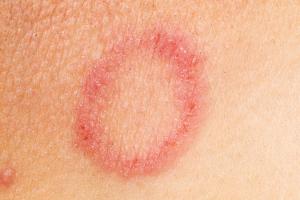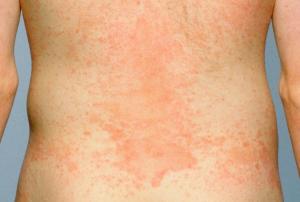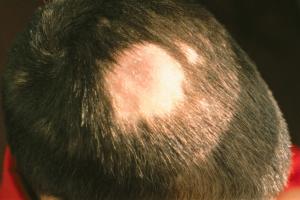Ringworm
Ringworm is a common fungal infection that can cause a red or silvery ring-like rash on the skin. Ringworm commonly affects arms and legs, but it can appear almost anywhere on the body. Despite its name, ringworm doesn't have anything to do with worms.
Symptoms of ringworm

The symptoms of ringworm include:
- a ring-like red or silvery rash on your skin – your skin will look red and irritated around the ring, but healthy inside
- scaly, itchy and inflamed skin

In more severe cases:
- the rings may multiply, grow in size and merge together
- the rings may feel slightly raised and the skin underneath may be itchy
- blisters and pus-filled sores may form around the rings
The ring spreads outwards as it progresses. You can have one patch or several patches of ringworm. In more serious cases, your skin may become raised and blistered.
Head, face and neck ringworm

Ringworm on the face and neck may not appear ring-shaped, but may be itchy and swollen, and it can become dry and crusted.
If you have a beard, you may notice patches of hair breaking away, or patches of hair loss on your head if you have ringworm infection in the scalp.
Hand ringworm
Ringworm on the hand often causes the skin to become thicker on the palm and in between the fingers. It may affect one hand or both and normally only appears on one side.
Causes of ringworm
Ringworm is a fungal infection. It is passed between people through direct skin contact and by sharing objects such as towels, hairbrushes and bedding.
Pets, such as dogs and cats, can have ringworm, and you can catch it by stroking them.
Treating ringworm
Most ringworm infections are mild and can be treated by an antifungal cream from your local pharmacy.
Talk to your pharmacist first and you may also need to see your GP to confirm a diagnosis.
Scalp infections can be treated with antifungal tablets, sometimes together with antifungal shampoo.
If the skin is irritated or broken, it can lead to other bacterial infections, which may need treatment with antibiotics.
Tinea fungal infections
Other similar fungal infections can affect the scalp, feet, groin and nails.
These fungal infections, medically known as tinea, are not serious and are usually easily treated. However, they are infectious and easily spread.
When to seek medical help
You should make an appointment to see your doctor if you:
- or your child develop the symptoms of a fungal scalp infection
- have ringworm that has not improved after two weeks of treatment with antifungal cream
- have another medical condition, or you’re having medical treatment that is known to weaken your immune system, such as chemotherapy or steroid tablets
Preventing the spread of ringworm
It's important to prevent the infection spreading. You should avoid sharing towels, bedding or clothes with someone with a fungal infection.
If you think your pet has ringworm, take it to the vet. If your pet is treated quickly, you’ll be less likely to catch it.
If your child has a fungal infection, they can go to school, but you should let their teacher know.
More useful links
The information on this page has been adapted from original content from the NHS website.
For further information see terms and conditions.